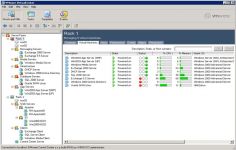 VMware Server 2.0.1
VMware Server 2.0.1
VMware Inc - (Freeware)
VMware Server allows server virtualization by sharing a physical server into multiple virtual machines.
VMware Server is a software based on server virtualization technology for Windows and Linux servers with enterprise-class support. It allows companies to share a physical server into multiple virtual machines.
VMware Server supports Linux and Windows servers for x86 hardware and 64-bit operating systems (Windows, Linux and Solaris), used by single or multi-core processors. This software is also compatible with Intel virtualization technology.
VMware Server is installed as an application and it allows the creation of virtual machines, through an assistant, VMware or Microsoft formats. It increase the CPU utilization of a physical server and it is able to move virtual machines from one physical server to another without re-configuration.
The software can be very easily used even by the inexperienced users.
- Title:
- VMware Server 2.0.1
- File Size:
- 507.5 MB
- Requirements:
- Windows 2000 / XP / Vista / Windows7 / XP64 / Vista64 / Windows7 64 / Windows8 / Windows8 64
- Language:
- en-us
- License:
- Freeware
- Date Added:
- 02 Apr 2009
- Publisher:
- VMware Inc
- Homepage:
- http://www.vmware.com
- MD5 Checksum:
- D0EEFAA79E42D13A693C4D732A460BA4
Security Fixes
* New: Host code execution vulnerability from a guest operating system
A critical vulnerability in the virtual machine display function might
allow a guest operating system to run code on the host. The Common
Vulnerabilities and Exposures project (cve.mitre.org) has assigned the
name CVE-2009-1244 to this issue.
* VMnc codec heap overflow vulnerabilities
The VMnc codec assists in record and replay of sessions which are records
of the dynamic virtual machine state over a period of time. Two heap
overflow vulnerabilities might allow a remote attacker to execute
arbitrary code on VMware hosted products. For an attack to be successful,
the user must visit a malicious Web page or open a malicious video file.
The Common Vulnerabilities and Exposures project has assigned the names
CVE-2009-0909 and CVE-2009-0910 to these issues.
* A VMCI privilege escalation on Windows-based hosts or Windows-based guests
The Virtual Machine Communication Interface (VMCI) provides fast and
efficient communication between two or more virtual machines on the same
host and between a virtual machine and the host operating system. A
vulnerability in vmci.sys might allow privilege escalation on
Windows-based machines. This might occur on Windows-based hosts or inside
Windows-based guest operating systems. Current versions of ESX Server do
not support the VMCI interface and hence they are not affected by this
vulnerability. To correct this vulnerability on Windows-based hosts, see
Virtual Machine Communication Interface (VMCI) privilege escalation on
Windows-based Workstation, Player, ACE and Server (KB 1009826).
The Common Vulnerabilities and Exposures project has assigned the name
CVE-2009-1147 to this issue.
* A remote denial-of-service vulnerability in authd for Windows-based hosts
A vulnerability in vmware-authd.exe might cause a denial-of-service
condition on Windows hosts. The Common Vulnerabilities and Exposures
project has assigned the name CVE-2009-0177 to this issue.
* Updated vm-support script
This release improves data collection when the vm-support script is run by
the Server administrator on request of VMware support or its support
partners. The file that contains the SSL keys for communication between
Server and vCenter and other applications is no longer collected. For more
details, see the KB article Data Security Best Practices - SSL keys for
communicating with VirtualCenter and other applications (KB 1008166).
* Windows-based host privilege escalation in hcmon.sys
A vulnerability in an I/O Control (ioctl) function in hcmon.sys might be
used to escalate privileges on a Windows-based host. The Common
Vulnerabilities and Exposures project has assigned the name CVE-2009-1146
to this issue.
New releases of hosted products address a denial-of-service problem
described in CVE-2008-3761, which can only be exploited by a privileged
Windows account.
* Denial-of -service vulnerability in a virtual device
A vulnerability in a guest virtual device driver might allow a guest
operating system to cause the host and consequently any virtual machine on
that host to fail. The Common Vulnerabilities and Exposures project has
assigned the name CVE-2008-4916 to this issue.
Miscellaneous
* Mount installer option mounts current CD-ROM image instead of VMware Tools
installer image
If a CD-ROM image is mounted to a virtual machine with VMware Tools
installed, the Mount installer option in the Web UI incorrectly mounts the
CD-ROM image instead of the VMware Tools image. The issue is resolved in
this release.
* Unable to install the latest version of VIX API on Server 2.0.x
You cannot install VMware VIX API 1.6.2 of due to an issue with the MSI
installer for VIX API. This issue is resolved in this release.
* The default VI Web Access HTTP connection port is 8222 and the default
HTTPS port is 8333. If you use these defaults, or any values other than 80
(HTTP) and 443 (HTTPS), you must specify the port number when you connect to
VMware Server using VI Web Access. You must also allow connection to these
ports through your firewall.
An example URL to connect to VI Web Access is http://server_host:8222
If you want to use ports 80 (HTTP) and 443 (HTTPS), override the default
values during installation.
Note: If you are running IIS or Apache web server on the default ports,
specify alternate HTTP and HTTP ports when prompted by the Windows
installer or vmware-config.pl. Alternatively, stop IIS's default Web site
or any other Web site running on these ports. On Linux, shut down Apache
or any other application using these ports and make sure they are not
configured to restart automatically.
This issue is resolved in this release.
Related software
4.6/5 from 46 users
